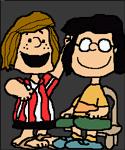For those of you who don’t know, the I Ching is the Book of Changes, an ancient system of Chinese divination that offers various subtle descriptions of situations one might encounter in life and how best to handle them.

My Mom has always been really into the I Ching, and when I was a bratty 16-year-old I would grudgingly go along with her readings. Then one time in college I borrowed her book and the reading it gave me was so eerily, exactly appropriate to my situation that it gave me pause. Since then I’ve taken it pretty seriously. And lately I’ve started adding this to my morning routine (since I’m currently unemployed I have the luxury of crafting a morning routine that isn’t ‘jump in the shower and grab a bagel on your way out the door.’)
Critics might argue that the answer is not found in the book at all, but in yourself –- and to this I say: BINGO. The book is a tool for sorting through your perceptions and getting some perspective and figuring out what to do. Something you can’t always figure out for yourself.
Anyway. All of this is to give you some context for this bit of wisdom I received the other day. I got the hexagram “the creative” which is the very first one in the book of changes. (The second one is “the receptive.”) It told me this:
The course of the creative alters and shapes beings
until each attains its true, specific nature.
RIGHT ON, I Ching. This mantra has been sticking in my head. It makes me think of the things I’ve learned through creative projects –- things that taught me about performance, sure, but more importantly made me who I am. (And of course, the I Ching isn’t talking about the creative in terms of art but in terms of the most basic life-giving principles.)
Specifically, I immediately thought about these three creative experiences in the last five years, and what they taught me:
BLUE on tour in Poland, 2004 & 2005:
- How to sing and be heard outside. How to hold attention and throw focus.
- How to push past limitations. How to keep going when you are exhausted and the situation is fucked. (Like: there isn’t enough power for lights so we’re going to have people turn their car headlights on. Or, a dog has wandered onstage and is peeing on the set. Or, the set is on fire. I could go on and on.)
- Taking the sheen off the idea that skills can be transferred to you magically upon contact with a “master”. The real training, what makes you strong and reliant, is in doing difficult things.
- How to teach when you can’t rely on language. How to adapt exercises to meet my own needs and the needs of the group.
- How to be a good host. How to make soup in 15 minutes.
- How to withstand pure terror. How to withstand a panic attack. How to do something when you really, truly think you can’t do it.
- How my voice works, how to make it strong without pushing too hard.
- The curative properties of BEET BLAST.
- How to make decisions. Lots of them.
- Why sometimes the best thing you can do is be brutally honest with someone about what you think, and sometimes the worst thing you can do is be “nice” and gloss over the fact that you are not in agreement.
- The strength of impure sources, impure training: the strength of a mutt.
- How to be super physical & vocal without hurting myself. (Of course this was only learned after a prolonged period of being super physical & vocal and hurting myself).
- The thrill of doing the thing you fear the most –- the liberation that results from doing it. That’s how you become fearless.
- The liberation in getting a truly bad review. The liberation didn't come right away, of course -- first there was the jaw dropping and the stomach churning. But later there was the sick pride that comes from being loathed for your work.
- Working with your body & voice, with strength and purpose, without pushing too hard
- Withstanding fear, panic, exhaustion and failure, and how this makes you stronger.
- Relying on yourself and trusting your gut when it comes to learning, teaching and growing.
- Learning how to do something by first learning how NOT to do it.
THANKS, I CHING!







